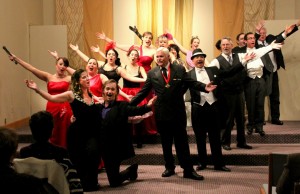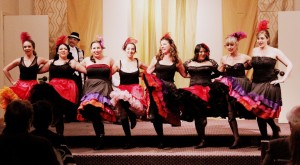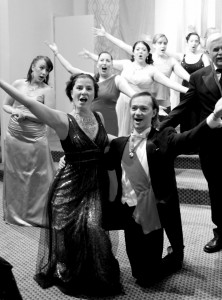ONE STEP FORWARD, TWO STEPS BACK
To open their second season, the Independent Opera Company (IOC) is performing Franz Lehar’s 1905 operetta The Merry Widow. It appears to be a scaling back after the company’s fairly ambitious production of Verdi’s Macbeth, which closed out their first season. In contrast to Macbeth, The Merry Widow is sung entirely in English according to the 1907 version of Basil Hood and Adrian Ross. Most of the dialogue is spoken rather than sung. Moreover, there is no orchestral  accompaniment, just artistic director Galina Barskaya’s more than adequate piano playing. There is still plenty of double casting, however.
accompaniment, just artistic director Galina Barskaya’s more than adequate piano playing. There is still plenty of double casting, however.
A product of fin-de-siècle Vienna, The Merry Widow presents an ethnically diverse landscape that is not so different from our own. Written by a Hungarian composer, it is set in the Paris embassy of an impoverished Balkan state. There are plenty of jokes at the expense of the French, which are as enjoyable today as they must have been to the British in 1907. The plot is driven by the efforts of the ambassador Baron Zeta to keep the fortune of rich widow Hanna Glawari in his home state by fending off her Parisian suitors and seeing her married to Count Danilo Danilovitsch. It is a fun and light-hearted romantic comedy.
Coril Prochnow is endearing as the titular widow. She brings an easy grace to the role that is lacking in her fellow cast members Eugene Carbajal as Njegus and Andrew Bennett as Camille. Carbajal looks dashing in his white waistcoat, tuxedo jacket with tails, pencil mustache and bowler hat, but his delivery is exceedingly awkward. Bennett, who had a small part in Macbeth, has bit off more than he can chew in The Merry Widow. As Valencienne’s would-be lover, Bennett not only fails  to pull off the part of dashing young gentleman, but his bearing is stiff and his acting rather uninspired.
to pull off the part of dashing young gentleman, but his bearing is stiff and his acting rather uninspired.
The bright spot of The Merry Widow’s cast is the alluring and talented Brooke deRosa as Valencienne. She impressed this reviewer last summer in Center Stage Opera’s production of Donizetti’s The Elixir of Love. In The Merry Widow, she fends off Camille’s advances and proves herself to be Baron Zeta’s faithful wife. DeRosa’s voice displays remarkable richness and maturity for her young age. Mark Sauter is dashing as the eligible bachelor Count Danilovitsch. His delightful tenor has a lightness of touch that compliments the mood of the opera well. Also enjoyable are Steve Chavez and Joseph von Buhler as the Parisian suitors Vicomte Cascada and Raoul de St. Brioche. They make an excellent comic duo.
No matter how good the cast, the IOC will always come across as a rather amateurish company as long as it continues to use St Andrew’s Lutheran Church. While the venue might cost the IOC nothing to use, since Barskaya is the church’s music director, St Andrew’s does not provide a flexible enough performance space.  The cross remains in the background, there is no stage curtain, exits and entrances require going through doors, and there is no stage lighting. Even if IOC had the budget, it would probably not be allowed to erect stage sets. And even though the company does not yet seem to need all of the church’s minimal seating, it will likely outgrow the space soon as well.
The cross remains in the background, there is no stage curtain, exits and entrances require going through doors, and there is no stage lighting. Even if IOC had the budget, it would probably not be allowed to erect stage sets. And even though the company does not yet seem to need all of the church’s minimal seating, it will likely outgrow the space soon as well.
Franz Lehar’s The Merry Widow comes across nowadays as a little dated, and, in its English incarnation, a bit too much like a Gilbert & Sullivan operetta. While the Independent Opera Company gives The Merry Widow a welcome and faithful airing, it comes across as disappointing, uninspired, and flat. As the first show of the season, this does not bode well for the company. If the IOC cannot easily pull of something as simple as The Merry Widow, how can it possibly do justice to Offenbach’s celebrated Tales of Hoffmann, scheduled to begin April 5?
photos by Natalie S. Moran
The Merry Widow
Independent Opera Company
St. Andrew’s Lutheran Church, Nolte Hall
11555 National Blvd
scheduled to end January 26, 2014
for tickets, call (310) 477-0257 or visit www.IndependentOperaCompany.com

